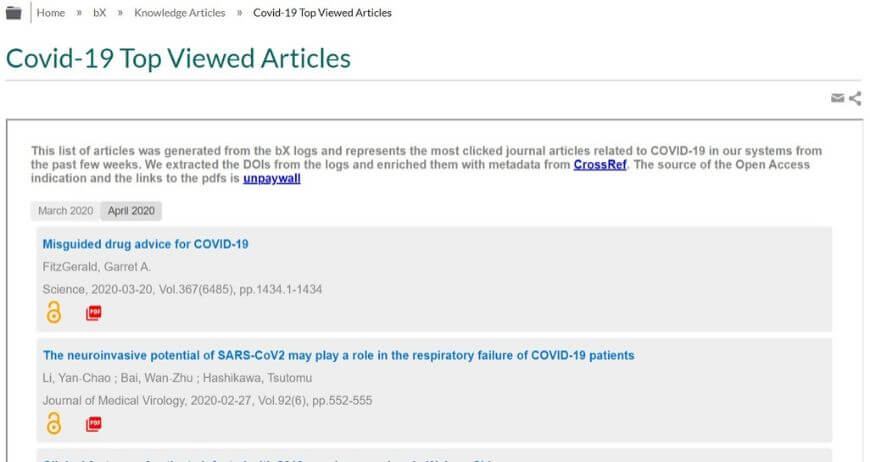The following article was originally published in Research Information
Christine Stohn, Senior Product Manager for Discovery and Delivery, Ex Libris
Library users have a variety of needs and goals when they search for information. They may be looking for a specific item, such as a book, an article, an e-book, or a multimedia recording. Also, the information they seek may well depend on their level of expertise; for example, undergraduates may need materials for course assignments, whereas professors are more likely to be searching for the latest publications in their field or seeking data for a research project.
Libraries should cater to these diverse needs, providing users with an intuitive way to find the materials they desire out of the sea of physical, electronic, and digital resources and enabling users to access those materials in the easiest way possible. The challenging goal for discovery systems, then, is to enable libraries to bring together users, their intent and needs, and the wealth of available information.
How Do Users Search and Discover?
Search log analysis conducted by Ex Libris on a regular basis indicates that searches for specific items, or ‘known-item’ searches, remain a major discovery method for users, who expect to rapidly obtain the most relevant results.
However, this method, often called search and find, is far from being the only discovery practice that is important to the users of today. A recent user study conducted by Ex Libris* clearly shows that library users, particularly students, have broader needs and greater expectations from the discovery process. To understand these needs, we can look at several building blocks of discovery:
- Exploration: Users benefit from serendipitous discovery by browsing and by following recommendations and navigation trails. A typical exploration begins with a user’s selection of an item—for example, a subject, an author, or a title. The discovery system presents another group of items, from which the user makes another selection. Then the user continues to navigate onward to additional sets of related items, narrowing or expanding his scope
- Learning: The discovery process provides opportunities for learning. When working on papers and projects, undergraduate and postgraduate students often need to acquire new vocabulary, obtain new knowledge, and understand a general research area before narrowing it down.
- Personalization: Users expect discovery systems to provide the results most relevant to their needs and their search context. For example, a scholar who submits the query game theory might be seeking material in economics, whereas another scholar might submit that query to find material in mathematics. The same list of results does not work for everyone.
How Can Discovery Systems Support Users’ Needs?
Technological innovation and an increased understanding of users’ requirements help make the discovery process more efficient and effective. Discovery systems can contribute to achieving these goals by providing:
- Support for variations in queries for known-item searches and topic-based searches, based on intelligence gained on the search logs
- Advanced ranking algorithms that take into account the user’s profile and the nature of the search and are continuously tuned to reflect log-analysis results and customer feedback
- Support for content exploration, for example through citation trails, virtual browsing, and automated article recommendations
- Scalable technologies that automatically enrich the metadata of the hundreds of millions of articles in large discovery indexes, for example to provide topic clusters for exploration
- A variety of delivery methods, adapted and optimized to the needs of the individual library
- Discovery and delivery from any device, in any location, and at any time
Discovery today requires a holistic approach based on the building blocks noted here. By supporting multiple methods of discovery and employing the latest technologies, discovery systems can help libraries strengthen user engagement and deliver the fast, accurate, and intuitive experience that patrons seek.
* The Ex Libris user study included analyses of search logs, workshops with librarians at multiple institutions, qualitative surveys, and user interviews. A report on the research is available on the Ex Libris website.
You might also be interested in

Alma
Community
COVID-19
Librarianship
Library Discovery
May 19, 2020 |
1 min read
Introducing Two New COVID-19 Programs to Support Higher Education Institutions

bX
COVID-19
Librarianship
Library Discovery
Research
May 14, 2020 |
2 min read
What COVID-19 Articles did Patrons Access? A List of Top Viewed Articles

campusM
Leganto
Pivot
RapidILL
COVID-19
Library Discovery
Mobile Campus
Research
March 30, 2020 |
4 min read
COVID-19: New initiatives to support the Ex Libris community
Great library experiences start with software
Download whitepaper

Librarianship
Library Discovery
August 20, 2018 |
1 min read
Impact of Library Discovery: The Surveys Speak

Primo
Library Discovery
August 16, 2018 |
1 min read
How Effective is your Library Discovery? Three Important Tips

Library Discovery
Open Platform
February 07, 2018 |
1 min read
Choose Your Own Library Discovery Service

Library Discovery
Open Platform
February 07, 2018 |
1 min read
Choose Your Own Library Discovery Service

Library Discovery
Open Platform
February 07, 2018 |
1 min read
Choose Your Own Library Discovery Service

